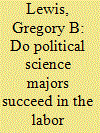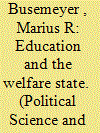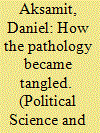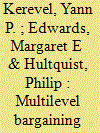| Srl | Item |
| 1 |
ID:
153800


|
|
|
| 2 |
ID:
153808


|
|
|
| 3 |
ID:
153807


|
|
|
| 4 |
ID:
153798


|
|
|
| 5 |
ID:
153813


|
|
|
|
|
| Summary/Abstract |
Despite some stakeholders’ concerns about the practical value of an undergraduate degree in political science, our graduates actually do quite well in the labor market. Based on analysis of a sample of 3.4 million college graduates (including 86,000 in political science) from the 2009–2014 American Community Surveys, our majors earn two-thirds more than demographically similar high school graduates if they stop with bachelor’s degrees, but they are among the most likely to obtain graduate degrees, especially in law. Only engineering, economics, computer science, and health science majors make at least 10% more than our graduates, who make nearly as much as those who major in business and 10% to 25% more than those who major in most other social sciences and humanities. Political science majors have relatively high unemployment rates in their 20s, however, and may end up in very different occupations than they imagined when they chose political science.
|
|
|
|
|
|
|
|
|
|
|
|
|
|
|
|
| 6 |
ID:
153806


|
|
|
| 7 |
ID:
153812


|
|
|
|
|
| Summary/Abstract |
Women earn 40% of new PhDs in political science; however, once they enter the profession, they have strikingly different experiences than their male counterparts—particularly in the small but influential field of political methodology. For several years, the Society for Political Methodology, with support from the National Science Foundation, has attempted to address this gender gap through the Visions in Methodology (VIM) program. VIM features an annual conference that brings women together to present and discuss their research and to participate in professional-development sessions. Do programs like VIM have the desired impact? Using an original survey of political scientists, this study provides insights into the ways that bringing women together in small-group settings like VIM might facilitate networking and enhance productivity. In particular, the study finds that women who attend the VIM conference are better networked and more productive in terms of publication.
|
|
|
|
|
|
|
|
|
|
|
|
|
|
|
|
| 8 |
ID:
153811


|
|
|
|
|
| Summary/Abstract |
Gender diversity is good for the study of international relations (IR) and political science. Graduate training is an opportunity for scholars to affect the demographics of their field and the gendered practices within it. This article presents a first-cut investigation of the degree to which gender bias exists in graduate IR syllabi. The author found that the gender of the instructor for graduate courses matters significantly for what type of research is taught, in two ways. First, on average, female instructors assign significantly more research by female authors than male instructors. Second, women appear to be considerably more reluctant than men about assigning their own research as required readings. Some but not all of the difference between male- and female-taught courses might be explained by differences in course composition.
|
|
|
|
|
|
|
|
|
|
|
|
|
|
|
|
| 9 |
ID:
153809


|
|
|
|
|
| Summary/Abstract |
This article explores publication patterns across 10 prominent political science journals, documenting a significant gender gap in publication rates for men and women. We present three broad findings. First, we find no evidence that the low percentage of female authors simply mirrors an overall low share of women in the profession. Instead, we find continued underrepresentation of women in many of the discipline’s top journals. Second, we find that women are not benefiting equally in a broad trend across the discipline toward coauthorship. Most published collaborative research in these journals emerges from all-male teams. Third, it appears that the methodological proclivities of the top journals do not fully reflect the kind of work that female scholars are more likely than men to publish in these journals. The underrepresentation of qualitative work in many journals is associated as well with an underrepresentation of female authors.
|
|
|
|
|
|
|
|
|
|
|
|
|
|
|
|
| 10 |
ID:
153819


|
|
|
|
|
| Summary/Abstract |
Despite the popularity of using games to teach international relations, few works directly assess their effectiveness. Furthermore, it is unclear if games help all students equally, or if certain students are more likely to benefit than others. Finally, how closely the game must mirror the concept being taught to be an effective pedagogical tool has received scant attention. We address these points by discussing the use of an updated version of the classic American election game, Consensus, to help illustrate the role of domestic political coalitions in an international political economy course. Assessing the performance of 39 students via a pre- and post-quiz, we find that student performance improved overall, particularly among frequent gamers.
|
|
|
|
|
|
|
|
|
|
|
|
|
|
|
|
| 11 |
ID:
153793


|
|
|
|
|
| Summary/Abstract |
Helicopter parenting is a phenomenon that is attracting sizable attention from university administrators and instructors. We examine the implications of helicopter parenting for both the political science classroom and for public opinion. Using a survey conducted at multiple universities in the United States, we find that helicopter parenting has a significant impact on the policy attitudes of college students. Specifically, students with helicopter parents are more likely to express support for both government surveillance and nanny state policies than are students without helicopter parents. Given the growing trend of helicopter parenting, these findings will likely have substantial implications for both the political science classroom and public opinion in the near future.
|
|
|
|
|
|
|
|
|
|
|
|
|
|
|
|
| 12 |
ID:
153801


|
|
|
| 13 |
ID:
153804


|
|
|
| 14 |
ID:
153796


|
|
|
| 15 |
ID:
153795


|
|
|
| 16 |
ID:
153815


|
|
|
|
|
| Summary/Abstract |
This study examines the scholarly practice of “knowledge sharing” and the extent to which it is rewarded by prevailing faculty-incentive structures. Following recent calls for greater connectivity between the academic and practitioner communities in both political science and public administration, there is a need for greater empirical evidence regarding the extent to which these practices are being employed across the discipline and how their use varies across institutional settings. Focusing on “knowledge sharing” as a specific dimension of “engaged scholarship,” this article reports the findings from a recent survey of public affairs and administration program leaders regarding current standards for earning tenure and promotion. Relevant scholarly practices are discussed and the reported value of these practices for earning tenure and promotion is presented. Institutional types are compared and recommendations are made for improving the dissemination of scholarly knowledge to the public administration practitioner community.
|
|
|
|
|
|
|
|
|
|
|
|
|
|
|
|
| 17 |
ID:
153791


|
|
|
|
|
| Summary/Abstract |
Is the United Nations Security Council (UNSC) a legitimate organization? Do the veto powers legitimately pursue international security, or do they protect their narrow national interests? One way to evaluate the legitimacy of the UNSC is through its agenda. Does it address the most significant conflicts in world politics? Or is it influenced by the national interests of the veto powers? This article addresses these questions with a dataset that includes the number of UNSC meetings held and resolutions passed on 40 conflicts from 1991 to 2013. This analysis provides evidence for the legitimacy of the UNSC—conflicts with more refugees and more deaths are significantly more likely to be on the agenda. The analysis does not support critics of the UNSC—the national interests of the veto powers, measured as arms sales to and trade with the conflict participants, do not significantly alter the UNSC agenda.
|
|
|
|
|
|
|
|
|
|
|
|
|
|
|
|
| 18 |
ID:
153805


|
|
|
| 19 |
ID:
153794


|
|
|
| 20 |
ID:
153820


|
|
|
|
|
| Summary/Abstract |
This article introduces a regional trade agreement (RTA) simulation for undergraduate students. The simulation uses a multilevel bargaining framework, in which students can represent not only governments of negotiating countries but also domestic interests. By allowing students to experience international bargaining at different levels, they gain a deeper understanding of controversial international trade processes.
|
|
|
|
|
|
|
|
|
|
|
|
|
|
|
|